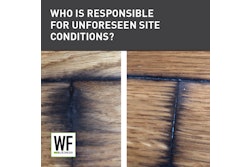
Wood floor companies are in the business of installing flooring. If a homeowner wants a floor, there will almost always be a contractor willing to help them out. But there’s a saying in the industry, “Sometimes the best job is the one you didn’t get.” These are the jobs you wish you’d said no to. Hopefully, you walk away from these jobs with only a few new gray hairs, but sometimes the problems are more significant. Perhaps the customers refused payment or are unable to pay at all. Maybe they damaged your work but demand you repair it free of charge. How do you deal with that? You might think, “I’ll have to sue my own customer.”
RELATED: Sometimes Losing a Customer Is the Best Choice You Make
However, if you approach a lawyer to file your case, they may respond the way you wish you would have initially: “No.” Indeed, some lawyers will simply refuse to take your case, no matter how badly you want to sue. Why? Because not every lawsuit is worth bringing. Before you see a lawyer and possibly spend money only to have the lawyer advise you against suing, ask yourself the following questions to determine if you have a case worth filing.
How much are you owed?
This question is important when deciding whether to sue and where to sue. It also will factor into whether you hire a lawyer. If your customer owes a few hundred dollars, the cost of filing the lawsuit, serving the lawsuit and other associated costs may exceed what the customer owes. While there is some value to setting an example, more often than not you will spend your own money and gain nothing. With that in mind, if you are going to proceed, the amount you are looking to collect will determine in which court you must file, whether that is a small claims court, a lower level court or the main court (the names of these courts vary from state to state). Your state’s laws and the type of court will determine whether you need a lawyer. For example, in Arizona, a corporation may represent itself in small claims and justice court, but generally must be represented by a licensed attorney in superior court.
Will you recoup the legal fees?
If you have a written contract, be sure to state the customer will be responsible for any collection costs you undertake. The costs might include everything from mailing letters to lawyer and court filing fees, among other costs. You must spell these costs out in the contract, otherwise you are unlikely to get them. If you don’t have a written contract that provides for this, unless the customer owes you quite a bit of money, you will be hard-pressed to justify the lawsuit.
How collectible is the debt?
Put bluntly, there is no point in filing a lawsuit if you will not be able to get paid if you win. So, how likely is the “pot of gold” going to be at the end of your lawsuit “rainbow?” Things that help ensure collectability include mechanic’s liens; a customer with a lot of property, real estate or other assets against which you can collect; or a customer who has a strong income. Conversely, if the customer is unemployed, has no assets, is bankrupt or you don’t have a mechanic’s lien, then you may sue and find yourself with a worthless piece of paper at the end that says the customer owes you money … but that money will never actually come to you.
Aside from the availability of money or assets, the other consideration is whether you are still within your time frame to sue. Each state has statutes of limitation that stipulate how long you have to bring a particular type of lawsuit. If you have a written contract, the period for bringing the lawsuit is typically much longer than if your contract is based on an oral exchange of agreements (i.e., the proverbial “handshake” agreement).
Will your customer countersue?
Usually a customer has a reason—justified or not—for refusing to pay. Before suing, determine whether you have done anything that can give rise to the customer having a claim against you. In some instances, the customer’s claim may only reduce the amount you would get from them. In others, you could end up owing money to the customer. Even if the customer’s claim is completely false, you still have to factor in the cost and difficulty of proving that. As a worst-case example, suppose your customer purposefully damages your work just out of spite? (This actually happens.) Will you be able to document the condition of your work before you left? If the judge or jury have to decide which of you is telling the truth, consider the likelihood that they may decide they can’t be sure and just “split the baby”—or worse, they will side with the homeowner.
Do you have license or insurance issues?
Some states, counties or municipalities require specific licenses for different types of construction work. Which licenses are required depends on where the property is located. So, if your business is located in a border town between two states, for instance, your work might be legal in one state but illegal in another. In some cases it can be difficult to tell under which jurisdiction a particular property falls.
Another thing that happens frequently is that the contractor will have one license but, while on the job, agree to do some other “minor” work for a customer. The customer then says “gotcha” and doesn’t pay for that “minor” work because it falls outside the contractor’s license scope. In this case, you might not be able to sue them at all.
RELATED: Engineered Enigmas: Know These Answers to Avoid Problems
Did you have insurance coverage for your work? Or a license bond? If you do have insurance, is there a chance your insurance company may decide not to renew your policy because you filed the lawsuit (particularly if you lost and they had to pay your customer as a result)? The time to think about these potential risks is before the lawsuit is filed.
Have you attempted to negotiate?
If you haven’t attempted to negotiate payment with the customer, you should probably do that first. Given each of the issues above, even a fairly large discount on your services might be better in the long run than the risk and costs associated with a lawsuit. Plus, by attempting to negotiate, you may find that the customer’s reason for not paying is something you can readily address and thus get paid without filing a lawsuit. Maybe the customer mistakenly thinks that by paying you the last money owed, you will leave without addressing the punch list. Knowing this, perhaps you can educate the customer as to your requirements and intentions, or simply complete the punch list work to get paid. Certainly, if you don’t complete the punch list work, it will become a basis to seek a reduction in the amount payable to you if you do file a lawsuit, so this is something well worth addressing ahead of time.
Do you want the publicity?
A lawsuit can create crippling negative publicity. First, lawsuits are generally public proceedings, so they can be searched. A bad outcome in a lawsuit can follow a business for a long time. Second, filing a lawsuit against a customer can invite negative reviews online, and it doesn’t take much to get a ton of support from folks who want to help out the customer perceived as being bullied by a business. While you cannot let the threat of negative publicity keep you from filing a lawsuit, you should not make your decision to file a lawsuit without considering how you might address such publicity. In short, the decision to file suit must be considered carefully and only after you have evaluated and addressed all of the potential risks.

































